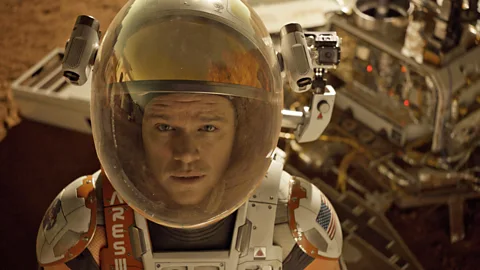Film Review: Does The Martian get lost in space?
 20th Century Fox
20th Century FoxThe eagerly anticipated Ridley Scott film stars Matt Damon as an astronaut marooned on the Red Planet – but does it ever truly blast off? Owen Gleiberman weighs in.
The last grand-scale space opera to play the Toronto International Film Festival was out of this world in every sense. Two years ago, Gravity was a film of genuine pop vision, made with such flowing virtuosity and skill that it seemed like the entire movie went by in a single breathlessly sustained shot. The Martian, starring Matt Damon as an astronaut stranded on Mars, owes an obvious debt to Gravity: it’s yet another tale of solo survival in space, and it, too, has been made with impeccable craftsmanship – in this case, by the veteran director Ridley Scott. Its technological detail is believable enough to feel that it might really be happening.
Yet the similarities end there. Unlike Gravity, which built a constant sense of surprise right into its dazzling form, The Martian is old school and a bit stodgy – an adventure that’s been banged together out of a lot of overly familiar spare parts. It mixes honest fun with leaden, predictable storytelling. You keep feeling that you know what’s coming, as if you had seen it all before. And in fact, you probably have.
The Martian kicks off as a kind of Robinson Crusoe on Mars (which was actually the title of a cheesy Hollywood thriller made in 1964), and for an hour or so it’s reasonably riveting. Damon’s Mark Watney is part of an elite crew of scientists who have spent a year journeying to the Red Planet. Scott does a magnificent job of visualising Mars, as an even more epic Monument Valley without end. But then a storm drenches the crew in scary debris, and they jump into their ship to escape, thinking that Mark is dead. Actually, he’s just been wounded, and when he wakes up and figures out his predicament, the film becomes a dramatic comedy about the logistics of survival.
Where no man has gone?
Mark still has the abandoned space station, and he puts his training as a botanist to use to grow hothouse potatoes in freeze-dried astronaut excrement, and to forge water from burning hydrogen. After a while, he also figures out how to signal the Nasa folks at mission control that he’s out there. Damon makes acerbic entries into his video diary, tossing off lines like, “I don’t want to sound arrogant or anything, but I am the greatest botanist on this planet” – striking an amusing balance between ingenuity and hopelessness. He energises The Martian, giving it a charismatic core, but I wish that Mark had been allowed to unravel a bit more, like the James Franco character in 127 Hours. Mark is so self-possessed that he’s a little monochromatic.
Once he makes with Nasa, the suspense begins to leak out of the movie. Will Mark’s supplies last long enough? A vital question, but not exactly one to get our pulses racing. The head of Nasa, played by Jeff Daniels as a contemptible utilitarian, orders his associates not to inform Mark’s crewmates that he’s still alive, so that nothing will distract them from their voyage home. The film tries to trump this up into a fierce ethical conflict, but once again, it’s not really all that dramatic. There’s also a cloying, ‘imagine all the people’ side to The Martian: by the end, the whole world is watching, and China’s version of Nasa slips one of its top secrets to the US in order to help get Mark home. That may be the movie’s single most far-fetched note of science fiction.
The Martian is like Gravity without the floating, Apollo 13 without the documentary intrigue and 127 Hours without the mental breakdown. Despite being shot with dazzling skill, it’s all a little old hat. Terrific actors like Chiwetel Ejiofor and Kristen Wiig are on hand as Nasa officials, and you can feel how hard they’re working to inject a bit of personality into their stock roles. Even the running theme of disco – the fact that Mark hates it, though it’s the only music he has to play, as well as the corny way that Scott employs tracks like Hot Stuff and Waterloo – feels é. The Martian is beautifully designed and packaged entertainment, with dashes of visual awe, but it’s also the definition of a movie that’s not nearly as exciting as you wished it was.
★★★☆☆
